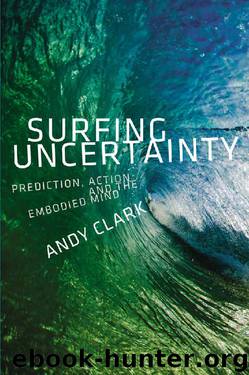Surfing Uncertainty: Prediction, Action, and the Embodied Mind by Andy Clark

Author:Andy Clark [Clark, Andy]
Language: eng
Format: epub
Publisher: Oxford University Press
Published: 2015-10-02T04:00:00+00:00
7
Expecting Ourselves (Creeping Up On Consciousness)
7.1 The Space of Human Experience
We have covered a large and varied territory. Our story began with the neat trick of learning about the world by trying to predict our own changing sensory states. We went on to explore the use of that trick (in a multilevel setting) to inform perception, imagination, action, and simulation-based reasoning about the world and about other agents. We saw how ongoing estimations of the relative uncertainty associated with activity in different neural populations could further transform the power and scope of such a story, rendering the flow of processing dynamically reconfigurable and delivering context-sensitivity on a truly grand scale. And we have begun the crucial and continuing task of understanding how active, embodied agents put such resources to use by creating and maintaining perception-action cycles that reflect organismic needs and environmental opportunities. Thus enhanced our story has, I believe, the resources required to illuminate the full spectrum of human thoughts, experiences, and actions.
To make good on such a claim—or perhaps even to make such a claim genuinely intelligible—we now need to bring this quite theoretical, large-scale picture into closer contact with the shape and nature of human experience. We need, if you will, to begin to recognize ourselves in the swirl of ongoing, multilevel prediction. At that point, many of the more practical—and humanly significant—aspects of our picture begin to emerge, revealing something of the complex space of human minds. Within that space, a few key principles and balances (involving prediction error and its delicate role in the unfolding of action) may determine the shape and nature of both normal and atypical forms of human experience.
There is no way, of course, that I can fully deliver on this. Sadly, but unsurprisingly, a convincing account of the full spread of human experience and its mechanistic (and sociocultural) roots lies significantly out of reach. But an emerging literature offers some promising hints, a few simplified models, and a smattering of intriguing (but speculative) proposals. What, then, can predictive processing hope to tell us about consciousness, emotion, and the varieties of human experience?
Download
This site does not store any files on its server. We only index and link to content provided by other sites. Please contact the content providers to delete copyright contents if any and email us, we'll remove relevant links or contents immediately.
Periodization Training for Sports by Tudor Bompa(8237)
Why We Sleep: Unlocking the Power of Sleep and Dreams by Matthew Walker(6684)
Paper Towns by Green John(5164)
The Immortal Life of Henrietta Lacks by Rebecca Skloot(4566)
The Sports Rules Book by Human Kinetics(4367)
Dynamic Alignment Through Imagery by Eric Franklin(4200)
ACSM's Complete Guide to Fitness & Health by ACSM(4040)
Kaplan MCAT Organic Chemistry Review: Created for MCAT 2015 (Kaplan Test Prep) by Kaplan(3993)
Livewired by David Eagleman(3754)
Introduction to Kinesiology by Shirl J. Hoffman(3753)
The Death of the Heart by Elizabeth Bowen(3596)
The River of Consciousness by Oliver Sacks(3589)
Alchemy and Alchemists by C. J. S. Thompson(3502)
Bad Pharma by Ben Goldacre(3413)
Descartes' Error by Antonio Damasio(3261)
The Emperor of All Maladies: A Biography of Cancer by Siddhartha Mukherjee(3133)
The Gene: An Intimate History by Siddhartha Mukherjee(3085)
The Fate of Rome: Climate, Disease, and the End of an Empire (The Princeton History of the Ancient World) by Kyle Harper(3046)
Kaplan MCAT Behavioral Sciences Review: Created for MCAT 2015 (Kaplan Test Prep) by Kaplan(2972)
